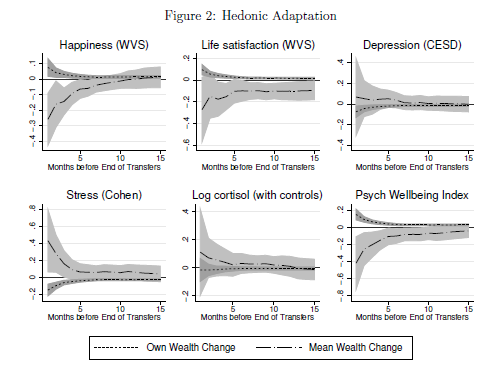GiveDirectly, the awesome charity that gives cash directly to poor people in developing countries, is back in the news. This time, they are getting attention for a study that uses the random variation in individual income provided by their original experiment to study whether increases in in the wealth of others harm people’s subjective well-being. This is an assumption that underlies a surprisingly popular theory that posits that increases in inequality per se have a direct impact on people’s health.* The most popular formulation of that theory says that inequality raises stress levels, which in turn cause poor health. This theory relies on inequality having a direct effect on stress and other measures of subjective well-being. Given how popular the stress-based theory is, there is surprisingly little evidence of this core claim.
Enter Haushofer, Reisinger, and Shapiro. Using the fact that the GiveDirectly RCT didn’t target all households in a given village, and randomized the intensity of the treatment, they can estimate the subjective well-being impacts not only of one’s own wealth but also of one’s neighbors’ wealth. Their headline result is that the effect of a $100 increase in village mean wealth is a 0.1 SD decline in life satisfaction – which is four times as big as the effect of own wealth. However, that effect declines substantially over time due to hedonic adaptation. This is an important contribution in a literature that lacked credible evidence on this topic.
However, not everyone is happy that they even looked at this question. Anke Hoeffler raises a concern about the very existence of this study.
I was just overwhelmed by a sense that this type of research should not be done at all. No matter how clever the identification strategy is. Am I the only one to think that is not ethical dishing out large sums of money in small communities and observing how jealous and unhappy this makes the unlucky members of these tight knit communities? In any case, what do we learn from a study like this? The results indicate that we should not single out households and give them large sums of money. So I hope this puts an end to unethical RCTs like this one.
I think this study was fundamentally an ethical one to do, for two distinct reasons: additionality and uncertainty.
By “additionality”, I am referring to the fact that this study uses existing data from an experiment that was run for a totally different reason: to assess the effects of large cash transfers to the poor on their spending, saving, and income. No one was directly exposed to any harm for the purpose of studying this question. Indeed, these results need to be assessed in light of the massive objective benefits of these transfers. One reading of this paper is that we should be more skeptical of subjective well-being measures, since they seem to be understating the welfare benefits of this intervention.
Second, uncertainty. We had limited ex ante knowledge of what this intervention would even do. Assuming that the impacts on subjective well-being and stress could only be negative takes, I think, an excessively pessimistic view of human nature. Surely, some people are happy for their friends. The true effect is probably an average of some positives and some negatives.
Indeed, the study has results that are surprising if one assumes the stress model must hold. What we learned from this study was much more subtle and detailed than a simple summary of the results can do justice to. First off, the authors emphasize that the effects on psychological well-being, positive or negative, fade away fairly quickly (see graph below). Second, the authors can also look at changes in village-level inequality, holding own wealth and village-mean wealth constant. There the effects are zero – directly contradicting the usual statement of the stress theory. If one’s neighbors are richer, it does not matter if the money is spread evenly among them or concentrated at the top.

Third, the treatment effects are more mixed, and probably smaller, than the elasticity quoted above. There’s no ex ante reason to think life satisfaction is the most relevant outcome, and none of the other measures show statistically-significant effects. Indeed, if we take these fairly small and somewhat noisily-estimated point estimates as our best guesses at the true parameter values, we should also take seriously the effects on cortisol, a biomarker of actual changes in stress. Here, the impact is negative: an increase in village-mean wealth makes people (very slightly) less stressed. This result is even stronger when we focus just on untreated households, instead of including those who got cash transfers. One way of accounting for the variation in these estimates that improves the signal-to-noise ratio is to look at an index that combines several different outcomes. The effects on that index are still negative, but smaller compared with the direct effects of the transfer. If we look just at effects on people who did not get a transfer, that index declines by 0.01 SDs, which is only a third of the magnitude of the effect of one’s own wealth change (a 0.03 SD increase).
My conclusion from the evidence in the paper is twofold. First, there’s nothing here to suggest that the indirect effects of others’ wealth on subjective well-being are large enough to offset the direct benefits of giving cash to the poor. Second, the evidence for direct effects of others’ wealth on subjective well-being is fairly weak. This paper is far and away the best evidence on the topic that I am aware of, but we can barely reject that the effect is zero, if at all. That casts doubt on the stress-and-inequality theory, and means that more research is certainly needed on the topic. More experiments that give money to the poor would be a great way to do that.